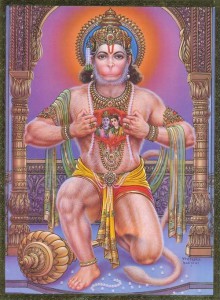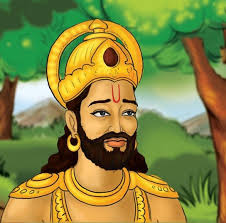In the Ramayana, after the mighty Ravana was killed by Lord Rama, the valiant Hanuman rushed to the Ashoka Vana to deliver the joyous news to Sita Devi. Overwhelmed with happiness upon hearing of Rama’s victory, Sita Devi expressed her gratitude to Hanuman and offered him any boon he desired.
Filled with anger towards the demonesses who had tormented Sita Devi during her captivity, Hanuman asked for permission to punish them. However, Sita Devi, demonstrating her boundless compassion and magnanimity, refused his request. She explained that the demonesses were merely following Ravana’s orders and were not inherently evil. To illustrate her point, she narrated the following story.
The Story of the Hunter, the Lion, and the Bear
Once, a hunter was in the forest, tracking a lion. In his pursuit, he tripped and lost his weapons. The lion, seizing the opportunity, began to chase the now defenseless hunter. Desperate for his life, the hunter climbed a nearby tree, seeking refuge. There, he encountered a bear resting on a branch.
The hunter, fearing for his life, begged the bear to protect him. The bear, compassionate and noble, agreed to spare his life. Shortly after, the lion arrived at the base of the tree. Seeing the hunter, the lion urged the bear to push the man down so that they could both feast on him. The bear, upholding his promise and principles, refused to harm the hunter.
As time passed, the bear fell asleep. Seizing the moment, the lion urged the hunter to push the sleeping bear down in exchange for his safety. The hunter, driven by fear and selfishness, pushed the bear. However, the bear managed to catch hold of another branch and saved himself.
The lion, seeing the bear’s survival, again encouraged him to push the ungrateful hunter. The saintly bear responded, “Great souls do not harbor enmity towards others, even if they are mistreated. It is in our nature to be compassionate.” The bear’s noble behavior deeply shamed the hunter, making him realize his own ingratitude.
The Moral of the Story
In the Srimad Bhagavatam, we encounter a similar example of compassion through the actions of Vidura. Vidura, a saintly person, advised his brother Dhritarashtra to rid himself of his wicked son, Duryodhana. However, Duryodhana, insulted by Vidura’s counsel, accused him of being a traitor and demanded his expulsion from the palace. Deeply hurt, Vidura left on a pilgrimage.
Despite the insult and mistreatment, Vidura’s compassion remained unshaken. He returned, having embraced the renounced order of life, solely to deliver his elder brother from his sinful ways. The Bhagavatam highlights Vidura’s selflessness and dedication:
Srimad Bhagavatam 1.13.14: kañcit kālam athāvātsīt sat-kṛto devavat sukham bhrātur jyeṣṭhasya śreyas-kṛt sarveṣām sukham āvahan
“Thus Mahatma Vidura, being treated just like a godly person by his kinsmen, remained there for a certain period just to rectify the mentality of his eldest brother and in this way bring happiness to all the others.”
Conclusion
The compassion exhibited by great souls like Sita Devi and Vidura serves as an example for all of us. They show us that true greatness lies in forgiveness and understanding, even towards those who have wronged us. This kind of compassion is the hallmark of saintly persons who strive to bring others closer to Krishna, irrespective of their past actions. By learning and imbibing these qualities, we too can progress on the path of devotion and spiritual enlightenment.
Hare Krishna, Hare Krishna, Krishna Krishna, Hare Hare
Hare Rama, Hare Rama, Rama Rama, Hare Hare
PS: I humbly request all devotees to forward and share these moral and instructive stories so that everyone can benefit from hearing about Krishna and His dear devotees.



